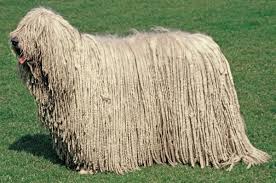
Komondor
Conditions of detention
Komondors thrive in rural or semi-rural environments where they have plenty of space to roam and exercise. They do best in homes with large, secure yards or farms where they can perform their guarding duties.
Useful Fact: Komondors are best suited for outdoor living due to their large size and active nature, but they should have access to shelter and companionship.
Nutrition and diet
A balanced diet rich in high-quality protein, fats, and essential nutrients is crucial for a Komondor’s health. Both high-quality commercial dog food and well-prepared homemade diets can meet their nutritional needs.
Useful Fact: Due to their size, Komondors may require more food than the average dog, especially during growth phases and active working periods.
Health
Komondors are generally healthy dogs with a lifespan of 10-12 years. They can be prone to certain genetic conditions such as hip dysplasia, bloat, and skin issues.
Useful Fact: Regular veterinary check-ups, maintaining a healthy diet, and ensuring proper exercise can help prevent common health issues in Komondors.
Grooming and care
Komondors have a distinctive corded coat that requires regular grooming. Their coat, which forms naturally into long cords, needs careful maintenance to prevent matting and ensure cleanliness.
Useful Fact: Grooming a Komondor can be time-consuming, as their cords must be separated regularly and kept clean to prevent odors and infections.
Education and training
Komondors are intelligent and independent, often requiring a firm and consistent approach to training. Positive reinforcement methods work best, as these dogs respond well to rewards and praise.
Useful Fact: Early socialization and obedience training are crucial for Komondors to develop into well-mannered adults, helping them balance their guarding instincts with good behavior.
Toys and entertainment
Komondors enjoy toys that challenge their minds and provide physical exercise. They particularly love activities that involve guarding or protecting, as well as interactive toys that stimulate their intelligence.
Useful Fact: Providing a variety of toys and engaging in regular play sessions can help keep a Komondor mentally and physically stimulated.
Safety
Ensure your Komondor has a secure environment, especially during outdoor activities, to prevent them from wandering or getting into danger.
Useful Fact: Komondors are naturally alert and make excellent watchdogs, but their protective instincts should be managed with proper training.
Accessories
A sturdy leash, comfortable harness, and ID tags are essential for your Komondor’s safety during walks and outings.
Useful Fact: Due to their size and strength, Komondors benefit from wearing a harness rather than a collar, as it helps distribute pressure evenly and prevents neck strain during walks.
Socialization
Early and continuous socialization is crucial for Komondors to ensure they are comfortable around people, other dogs, and different environments.
Useful Fact: Positive socialization experiences from a young age can help Komondors develop into well-adjusted adults, reducing the likelihood of fear or aggression.
Travel and Transportation
Komondors can travel well if accustomed to it from a young age. Ensure they have a comfortable crate or seatbelt harness for car rides.
Useful Fact: Regular short trips can help your Komondor become more comfortable with travel and reduce anxiety during longer journeys.
Behavior and psychology
Komondors are known for their loyalty, intelligence, and strong protective instincts. Understanding their behavior and providing appropriate outlets for their energy is important.
Useful Fact: Mental stimulation through training and interactive play is as important as physical exercise for a Komondor’s well-being.
Legal aspects
Owning a Komondor may come with specific legal requirements depending on your location, such as licensing, microchipping, and adherence to leash laws.
Useful Fact: Research local regulations and ensure you comply with any breed-specific legislation or requirements.


